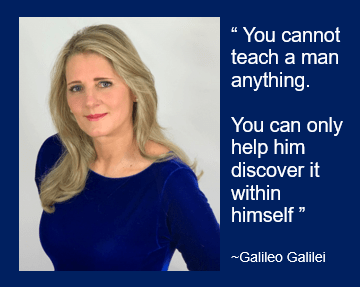“You can not teach a man anything. You can only help him discover it within himself.”
~Galileo Galilei
Mentoring is the same process: reciprocity, discovery, and renewal. Education requires one to work with others and learn from others. The role of a mentor for early career educators is the same. I have mentored teachers in all academic areas throughout my career, from music to special education, from history to technology education. In all of these relationships, the basis is trust, love, and care as we work together through the challenges and celebrate successes.
Mentoring is about helping people find their strengths as educators, and in the process, we as mentors find new strengths in ourselves.
No amount of book learning prepares people for the classroom experience. As a student teacher, you get a flavor, but having a classroom full of students changes one’s perspective. A mentor’s job is to offer guidance and support as a new educator adjusts to the reality of a room full of young minds. Mentees are now responsible for the well-being of a group of young people each year. That can be a heavy load for some. Throw in a pandemic, and you have a perfect storm of stress and anxiety for anyone beginning their career in the last twenty-four months, making good mentoring even more significant.
I have always viewed myself in this mentoring role as a partner in problem-solving as we establish goals and develop, try, and refine lessons. Mentoring requires mentors to have a firm handle on themselves as learners before helping another person do the same. They must be empathetic listeners and willing to give critical feedback through affirmations, goal setting, and action planning. Mentors must help early career educators by letting them know that they are not alone and that everyone needs support. Mentoring comes from a place of care, just as teaching does.
When people feel supported and cared for, they will see the strengths in themselves, they will persevere, and they will thrive in any situation.
Too often, many educators believe that turning to administrators for help can be viewed as a sign of weakness, making solid mentoring programs necessary. Mentoring gives early career teachers a place to talk when stressed or triggered by a particular incident in their school day. The mentoring relationship is a safe space that allows mentees to talk through difficulties and create a plan of action without fear of judgment. Everyone needs a place to safely talk out ideas, try, and sometimes fail with the full knowledge that there will be someone there to help them pick themselves up and try again.
As much as mentees gain from the mentoring process, so do the mentors. I have continued to hone my skills by observing beginning teachers throughout my career. They will often bring a skill set that veteran teachers may learn from, such as creating interactive, computer-based lessons. As a mentor, you should always be willing to learn as much from your mentee as the mentee might learn from you while collaborating to bring new meanings and understandings to the classroom. As mentors, we build leadership skills and get to view our profession through a new set of eyes and experiences that help us gain perspective about ourselves. There is always something new to discover about each other, our students, and our work in assisting young people in actualizing their dreams. I have always said that the day I cease to learn is when I need to leave education.
Mentoring is often a subtle process of helping someone develop, so mentors must have emotional support systems to provide the stability early career teachers need to find their footing as professional educators. My Dad was a wise man and once told me that to be successful, you must find your inner strengths as a learner and never be content to cease learning. That has been the basis for my work as a mentor – helping others find their inner strengths to help our students find their strengths as learners. It is an interweaving of potentials that carry us through life, that enable us to be good human beings who support and care for one another through all of life’s challenges. Education is the basis for all things. It gives us the ability to see capacities inside ourselves: for strength, for guiding our students, for growing as individuals and as a collective whole. Mentoring provides the wings that allow others to fly.
Article written by LéAnn Murphy Cassidy, Ed.S
Mentoring & Support for Mortgage Brokers
❤️Sue Hayter helps all mortgage broker business owners 🏆Award Winning Expert Mortgage Broker Mentor, Coach and Trainer
💎With all my mentor/mentee relationships: the foundation is trust, love, and care as we work together through the challenges and celebrate successes.
💎I have always viewed myself in my mentoring role as a partner in problem-solving as we establish goals and develop and refine learnings.
💎Whether you have Lending experience or no Lending experience👉
💎I have developed 8 unique mentoring & coaching packages to suit your individual skill set, timeframes and circumstances.
More info 👉Sue’s Expert Mortgage Broker Mentoring / Coaching Packages & Programs
✅Become a Mortgage Broker
✅Begin a New Career and be in Control of Your Destiny
✅Start your own business with an Inspirational Leader to guide YOU
👉Contact Sue Hayter Award Winning Expert Mortgage Broker Mentor, Coach and Trainer.

